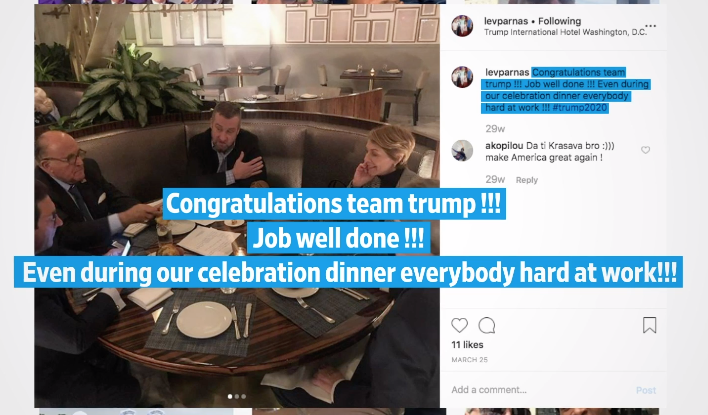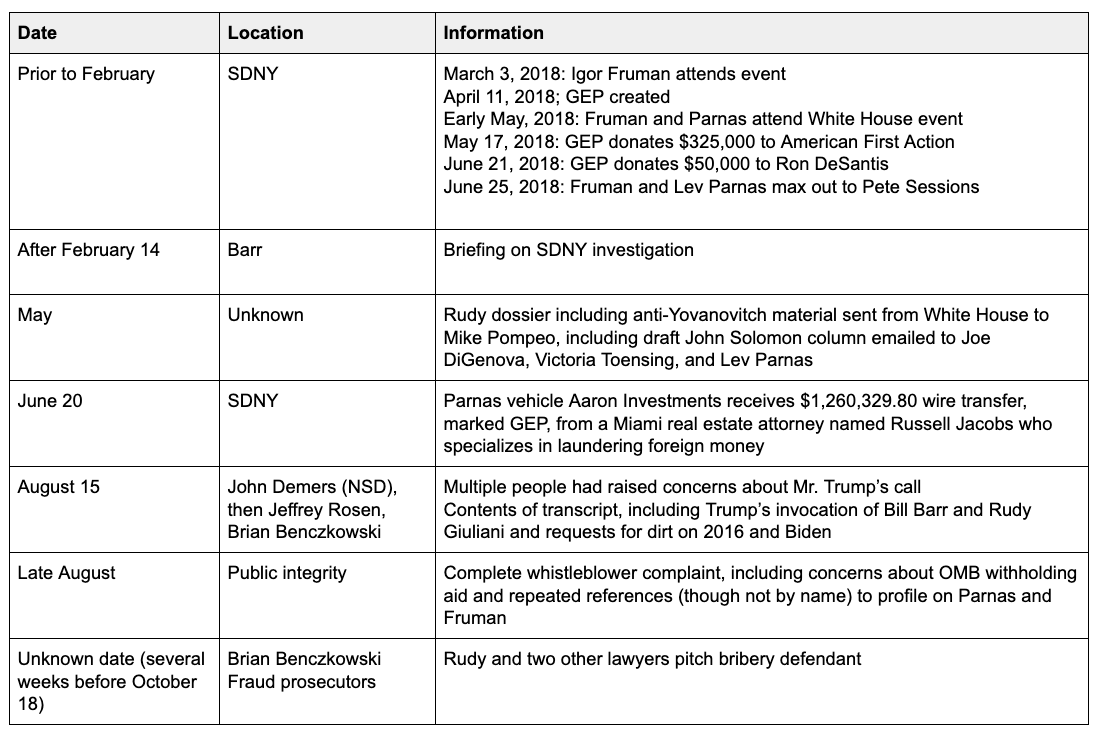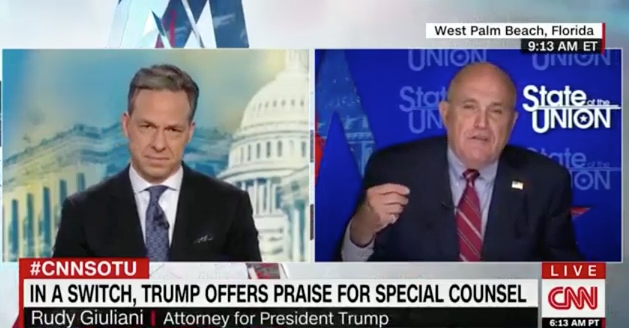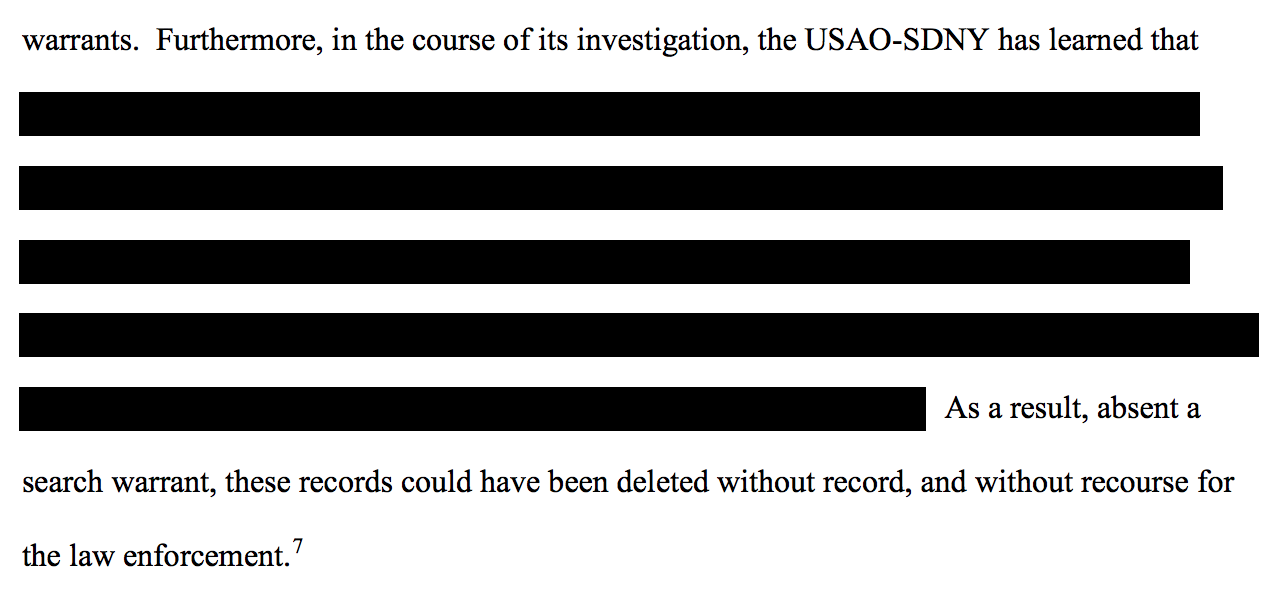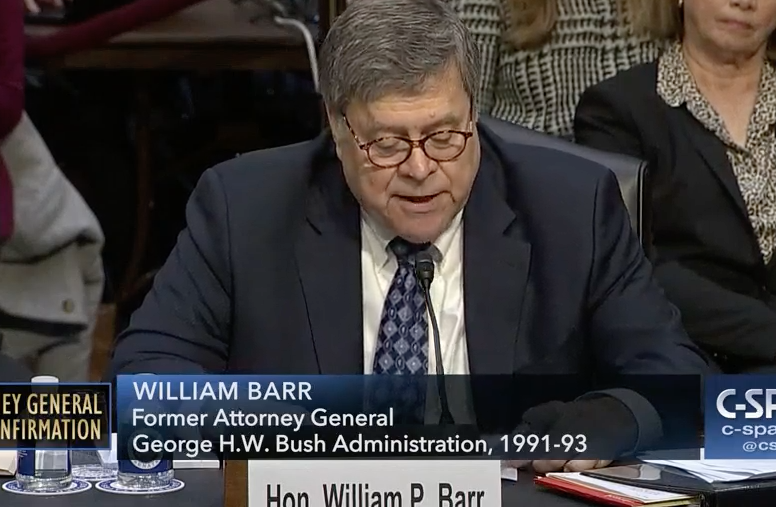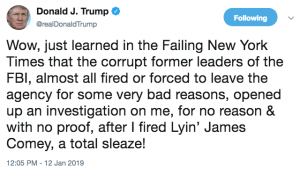How DOJ Worked Overtime to Avoid Connecting the Dots in the Whistleblower Complaint
As the legal saga of Lev Parnas and Igor Fruman plays out against the background of an impeachment inquiry launched when DOJ tried to bury a whistleblower complaint, DOJ has been forced to offer a series of increasingly inconsistent explanations about who at DOJ knew what when. I’ve been working on a timeline examining What Did Bill Barr Know and When Did He Know It (that work in progress appears below). While I’m not ready to answer that question, one thing is clear: the personnel under Brian Benczkowski who reviewed and dismissed the complaint in August could not have followed normal process on assessing a referral if NYT’s reporting and Benczkowski’s most recent claims are true.
Benczkowski tries to prevent Rudy Giuliani from implicating him in his crimes
I’m speaking of a comment that Benczkowski had released to NYT for an October 20 story explaining why Benczkowski and fraud investigators would be willing to hear Rudy Giuliani pitch a client’s case when he was under active investigation for influence peddling in SDNY himself.
“When Mr. Benczkowski and fraud section lawyers met with Mr. Giuliani, they were not aware of any investigation of Mr. Giuliani’s associates in the Southern District of New York and would not have met with him had they known,” said Peter Carr, a department spokesman.
That comment was a response to this Rudy-sourced Ken Vogel story that revealed the meeting, though without any of the answers as to Who What When questions that normally appear in finished news stories. The story may have been Rudy’s attempt to do the same thing he did as his shenanigans at State became public, raise the costs of making him the sole scapegoat by making it clear that his activities had high level knowledge and approval by Trump officials at the agency in question. That is, Rudy may have been making sure that if he gets in trouble for influence peddling, Brian Benzckowski will be implicated as well.
Importantly, both NYT stories on the meeting say the meeting happened a few weeks before October 18, a timeline that DOJ sources may be walking back in time considerably to “earlier this summer” included in this CNN article. One of the only ways for all these descriptions of timing be true is if the meeting took place around September 20, which would make it highly likely it involved Victoria Toensing, since Rudy was pictured meeting her and Lev Parnas across the street from DOJ that same day. (h/t DK for that insight) If it did (or if the descriptions of the meeting taking place a few weeks before October 18 are correct), then it means the meeting happened after DOJ reviewed and dismissed the whistleblower complaint about Trump’s July 25 call with Volodymyr Zelensky in late August.
As I’ll show below, the Peter Carr quote to the NYT might be true. But if it is, it means that well-connected Republicans can get a meeting with the Assistant Attorney General with almost no due diligence.
But if the Carr quotation is true (and if the timing of the meeting described to NYT is correct), then it is an on-the-record admission on behalf of Benczkowski that investigators working underneath him who reviewed and dismissed the whistleblower complaint did not follow procedures designed to keep our nation safe that have been codified since 9/11.
Benczkowski’s claim he didn’t know ignores what DOJ knew
Benczkowski’s explanation in the October 20 NYT story is based on a further one that suggests the only way he could have known about the criminal investigation into Parnas, Fruman, and Rudy is if a subordinate informed him directly.
While the Southern District of New York has been investigating Mr. Giuliani’s associates — an inquiry that may be tied to a broader investigation of Mr. Giuliani himself — prosecutors there had not told Mr. Benczkowski of the Criminal Division of the case, as he does not oversee or supervise their work. The United States attorney’s offices report to the deputy attorney general, Jeffrey A. Rosen.
Prosecutors in Manhattan informed Attorney General William P. Barr about the investigation of Mr. Parnas and Mr. Fruman soon after he was confirmed in February, according to a Justice Department official.
DOJ has locked into a statement that Bill Barr had been briefed on this investigation shortly after he was confirmed in February and repeatedly thereafter since the day the arrest of the Ukrainian grifters became public. But Benczkowski claims he didn’t know about it because he’s not in that chain of command. SDNY reports to the Deputy Attorney General, which would have been Rod Rosenstein when Barr was initially briefed, but would be Jeffrey Rosen in any of the briefings DOJ has admitted to since.
This table attempts to summarize what DOJ learned of Parnas, Fruman, and Rudy when. It’s incomplete in at least one important respect, as I’ll show. But it captures most of the ways DOJ and FBI would have been informed about parts of the Ukrainian grift.
Remarkably, we don’t yet know how the SDNY came to open the investigation. It could have been a Mueller referral, SDNY could have discovered the grift from something that happened in NYC (though the venue that ultimately got laid out in the indictment suggests the obvious signs of corruption took place in FL), or it could have stemmed from a Campaign Legal Center complaint filed with the FEC on July 25, 2018. But by the time Barr was briefed in February, we should assume that DOJ knew at least as much as CLC knew the summer before, which is that Parnas and Fruman had set up a shell company, Global Energy Producers, that they were using to make big donations to Republicans, including a $325,000 donation to a Trump SuperPAC just days after Parnas and Fruman met with Trump at the White House. That’s what Barr would have learned when he got briefed shortly after he was confirmed on February 14: that these Ukrainian-Americans were giving straw donations to Republicans in apparent coordination with key meetings with the recipients.
Here’s where the gap in this table comes in. Someone trying to spin the CNN for its version of the Benczkowski quote claimed that Rudy was not yet a focus of the SDNY investigation at the time Barr was briefed (the claim is silent, however, about all the other times Barr was briefed, per an October 10 statement from DOJ). Nevertheless, as CNN lays out, that claim is probably not true, because a NY lawyer was already getting questions from FBI counterintelligence agents by that time.
A person familiar with the matter said that at the time, Giuliani wasn’t a central figure in the case as he is now. That emerged in recent weeks, the person said.
Still, New York federal prosecutors had their eyes set on Giuliani months ago. A New York lawyer told CNN that FBI counterintelligence agents asked him questions in February or March related to Giuliani and his associates.
The day after the Ukrainian grifters’ arrest became public, NYT reported that Rudy was under investigation for FARA (for activities that extend well beyond his Ukraine work). Particularly given that the National Security Division is setting up a unit to prosecute FARA violations, that, plus the involvement of CI agents, should involve NSD and therefore would suggest that NSD head John Demers would know of the focus on Rudy. That can’t be guaranteed, however, because SDNY often does its own thing. So that’s the gap: We don’t know when Demers would have first learned that Rudy’s under investigation for his sleazy influence peddling.
We do know, however, that sometime in May, State Department’s Inspector General Steve Linick sent FBI (we don’t know which unit) the “Rudy Dossier,” the disinformation developed as part of his Ukraine work. Among the things that dossier includes is an email via which John Solomon sent a draft of this article to Rudy, Victoria Toensing, and Lev Parnas. Whoever received that dossier should have immediately identified that Parnas and Rudy were under active criminal investigation in SDNY for influence peddling, a topic on which that email would be directly relevant. In addition to Victoria Toensing and Rudy, the packet would also directly implicate the White House and Mike Pompeo, because the packet was sent under White House imprimatur to the Secretary of State. So by May, that dossier should have been in Parnas and Rudy’s investigative file. Except that, when Linick asked FBI if they were cool with him sharing the dossier with Congress, they were, which suggests it may not have been added to the investigative file.
Assuming that the vaunted SDNY is at least as sharp as a small campaign finance NGO, then by the time CLC updated their SEC complaint on June 20, SDNY would have known what that GEP’s straw donations (including a $325,000 donation to a Trump SuperPAC) came immediately after Parnas got a $1.2 million infusion from a lawyer who helps foreigners launder money through real estate, something that should have raised further counterintelligence and foreign campaign donation concerns.
After that, the whistleblower complaint comes into DOJ, in two different forms. The first time, it comes when CIA General Counsel Courtney Simmons Elwood and White House Associate Counsel John Eisenberg inform John Demers (who, remember, may or may not know about a FARA investigation into Rudy by this point). Demers went to the White House and reviews the transcript, which would have informed him that multiple people were concerned about the call, that Trump invoked both Rudy and Demers’ boss, Bill Barr, on the call, and that Trump was soliciting dirt related to both the investigation into the Russian operation in 2016 (ongoing parts of which Demers still oversees) and Trump’s imagined 2020 opponent, Joe Biden. If Demers did know that Rudy was under investigation for FARA at this time, Trump’s request that Ukraine share dirt with Rudy would have been directly relevant to that investigation, but in a way that implicated Demers’ boss as well. In any case, a simple database search would have revealed that, along with the $1.2 million cash transfer raising additional concerns about foreign money backing those campaign efforts.
Demers’ reported response to reading the transcript was to tell Brian Benczkowski (who claims not to have known about Parnas and Fruman, but whose Peter Carr quote was silent about whether he knew of any investigation into Rudy) and Jeffrey Rosen (who was probably confirmed after Barr’s first briefing on Parnas and Fruman, but who is currently Geoffrey Berman’s supervisor and so should be in the loop in the subsequent briefings that DOJ admitted Barr had after that initial briefing.
According to public reports, DOJ did nothing with this initial complaint.
DOJ avoids (admitting to) reviewing the full whistleblower complaint based off a false claim it doesn’t include direct knowledge
But then the whistleblower tried again, going to the Intelligence Community Inspector General and writing up his complaint, which then got referred to Brian Benczkowski and some public integrity investigators. According to Kerri Kupec, here’s what happened next.
In August, the Department of Justice was referred a matter relating to a letter the director national intelligence had received from the inspector general for the intelligence community regarding a purported whistleblower complaint. The inspector general’s letter cited a conversation between the president and Ukrainian President Zelensky as a potential violation of federal campaign finance law, while acknowledging that neither the inspector general nor the complainant had firsthand knowledge of the conversation,” Kupec said.
“Relying on established procedures set forth in the justice manual, the department’s criminal division reviewed the official record of the call and determined based on the facts and applicable law that there was no campaign finance violence and that no further action was warranted. All relevant components of the department agreed with this legal conclusion, and the department has concluded this matter,” Kupec concluded.
In another statement, Kupec said that Barr had not spoken with Mr. Trump about Ukraine investigating Biden, and that the president had not asked Barr to contact Ukraine or Giuliani.
In explaining how DOJ came to dismiss this complaint, Kupec cites not from the complaint itself, but from Michael Atkinson’s letter conveying the complaint. Kupec cites from the letter, which notes the whistleblower “was not a direct witness to the President’s telephone call,” and uses that to treat only the transcript of the call — not the broader whistleblower complaint itself, which does include firsthand knowledge — as the official record. And, having referred to just the call, DOJ viewed this as exclusively a campaign finance matter, and therefore dismissed it (DOJ ignores another crime laid out in Atkinson’s letter, a crime Mick Mulvaney has now confessed to, but I’ll come back to how they managed to ignore that).
In fact, parts of the whistleblower complaint make it clear that he was a direct witness to aspects of his complaint, and so DOJ should have treated the complaint itself as an official document (this is why the frothy right invested so much energy into the goddamned whistleblower form, to rationalize DOJ’s decision not to read the actual complaint).
Had DOJ read the complaint and done the most basic investigative work on the materials included in the complaint, they (including Benczkowski) would have known that Trump’s call related directly to matters under active investigation in SDNY.
While the whistleblower complaint does not mention Parnas and Fruman by name, it repeatedly invokes this OCCRP profile (see footnotes 4, 9, 10, 11), The profile would have made it crystal clear — if DOJ’s investigators couldn’t figure it out for themselves — how the evidence that SDNY was already reviewing (including the campaign finance stuff and the Rudy dossier) connected directly with the July 25 call.
Since early last year, the men have emerged from obscurity to become major donors to Republican campaigns in the United States. They have collectively contributed over half a million dollars to candidates and outside campaign groups, the lion’s share in a single transaction that an independent watchdog has flagged as a potential violation of electoral funding law.
The men appear to enjoy a measure of access to influential figures. They’ve dined with Trump, had a “power breakfast” with his son Donald Jr., met with U.S. congressmen, and mixed with Republican elites.
Months before their earliest known work with Giuliani, Parnas and Fruman also lobbied at least one congressman — former U.S. Rep. Pete Sessions, a Texas Republican — to call for the dismissal of the United States’ ambassador to Ukraine, Marie Yovanovitch. She stepped down a year later after allegations in the conservative media that she had been disloyal to Trump.
While setting up meetings for Giuliani with Ukrainian officials, the men also promoted a business plan of their own: Selling American liquefied natural gas to Ukraine to replace Russian imports disrupted by war.
Three days before the call itself, OCCRP and BuzzFeed had already laid out parts of the crime that SDNY has since indicted. And that profile was part of the whistleblower complaint provided to DOJ, in which DOJ claimed they could find no evidence of a crime.
FBI’s three investigative levels are Full Investigations (opened once FBI has evidence that a crime has occurred), Preliminary Investigations (opened once FBI has reason to believe a crime has been committed), and Assessments (the work FBI does to assess the credibility of tips). FBI Agents are expected — encouraged, explicitly, as a matter of national security — to do searches of FBI’s existing investigative databases at the Assessment level. They do this not just to make sure that suspected foreign agents like Parnas and Fruman aren’t allowed to insinuate themselves into top tiers of power unnoticed, but also for deconfliction, to make sure DOJ knows precisely which part of DOJ is investigating which people.
Had FBI followed its DIOG based on the information included in the whistleblower complaint, it would have been crystal clear that the July 25 call related to an ongoing Full Investigation, and the July 25 call — and the President’s extortion — would have been made part of that investigative record.
The Criminal Division Chief has confessed it did not follow protocols in reviewing this complaint
All of which brings me full cycle to DOJ’s efforts to pretend they didn’t know that Rudy was a suspected criminal when they met with him to discuss the accused criminals he represents.
Brian Benczkowski, the head of the Criminal Division (and yet, someone who has never prosecuted a case), claims that he had no way of knowing that Rudy Giuliani’s clients and co-conspirators were about to be indicted when he met with Rudy on some date no one wants to reveal. That may be true — though if it is, it means either his staffers did almost no due diligence before setting up that meeting, or the fact that Rudy, in addition to Parnas and Fruman, was under active investigation did not dissuade Benczkowski from taking the meeting.
But, if the meeting took place after the whistleblower review, as multiple reporters at NYT seem to believe it did, for him to claim that he didn’t know about Parnas and Fruman also amounts to an explicit confession that the investigators reviewing the whistleblower complaint did not follow FBI guidelines requiring them to look up all the names in a tip to see if the FBI already knows about them.
That is, Brian Benczkowski, in trying to claim ignorance of Rudy’s own legal problems in advance of that meeting, confessed that his division, hiding behind whatever false excuses, did not properly investigate the whistleblower complaint.
February 14: Barr sworn in.
February, undated: Barr and Public Integrity lawyers reporting to Brian Benczkowski briefed on investigation into Lev Parnas and Igor Fruman, though NYT reported lawyer questioned about Rudy in that time period.
March 5: Barr briefed on Mueller investigation.
March 22: Mueller investigation concludes.
March 24: Barr releases misleading “summary” of Mueller Report.
March 26: John Solomon posts column first reviewed by Joe DiGenova, Victoria Toensing, and Lev Parnas
April 19: DOJ releases redacted Mueller Report.
May, undated: State IG Steve Linick receives Rudy dossier, passes on to FBI.
May 31: Barr does interview explaining his Durham investigation without once explaining any irregularities to justify investigation.
June 20: Campaign Legal Center submits supplemental complaint to FEC.
July 18: OMB informs Departments that Trump has ordered suspension of all aide to Ukraine.
July 25: Trump-Zelensky phone call.
Week after call: Whistleblower informs CIA General counsel Courtney Simmons Elwood, who speaks several times to NSC lawyer John Eisenberg.
August 12: Date of whistleblower complaint.
August 14: Elwood and Eisenberg inform National Security Division head, John Demers.
August 15: Demers reads transcript of call. Senior DOJ officials, including Jeffrey Rosen, Brian Benczkowski, and Barr informed.
The deputy attorney general, Jeffrey A. Rosen, and Brian A. Benczkowski, the head of the department’s criminal division, were soon looped in, according to two administration officials.
Department officials began to discuss the accusations and whether and how to follow up, and Attorney General William P. Barr learned of the allegations around that time, according to a person familiar with the matter. Although Mr. Barr was briefed, he did not oversee the discussions about how to proceed, the person said.
August 26: IG Michael Atkinson hand delivers message on whistleblower complaint to Acting DNI Joseph Maguire.
September 3: Original classified OLC memo deeming the whistleblower complaint “not urgent,” treating Barr’s involvement as Top Secret.
September 20: Rudy, Parnas, Victoria Toensing and Joe DiGenova lunch at Trump International across the street from DOJ. Rudy also attends State Dinner for Australia.
September 24: Declassification of Telcon. Version of OLC memo hiding Barr’s involvement as classified issue.
September 26: Release of TelCon and whistleblower complaint. Justice Department explains non-prosecution:
In August, the Department of Justice was referred a matter relating to a letter the director national intelligence had received from the inspector general for the intelligence community regarding a purported whistleblower complaint. The inspector general’s letter cited a conversation between the president and Ukrainian President Zelensky as a potential violation of federal campaign finance law, while acknowledging that neither the inspector general nor the complainant had firsthand knowledge of the conversation,” Kupec said.
“Relying on established procedures set forth in the justice manual, the department’s criminal division reviewed the official record of the call and determined based on the facts and applicable law that there was no campaign finance violence and that no further action was warranted. All relevant components of the department agreed with this legal conclusion, and the department has concluded this matter,” Kupec concluded.
In another statement, Kupec said that Barr had not spoken with Mr. Trump about Ukraine investigating Biden, and that the president had not asked Barr to contact Ukraine or Giuliani.
September 29: AP claims Barr was “surprised and angry” when he learned he had been lumped in with Rudy. His further denials include a lot of wiggle room (including unofficial contacts).
Barr has not spoken with Trump about investigating Biden or Biden’s son Hunter, and Trump has not asked Barr to contact Ukranian officials about the matter, the department said. Barr has also not spoken with Giuliani about anything related to Ukraine, officials have said.
October 1: State IG Steve Linick briefs Congress on opposition packet routed to him from Pompeo. Preservation letters to Parnas and Fruman.
October 4: Initial rough date for Rudy meeting with Benczkowski.
October 9: Parnas and Fruman lunch with Rudy at Trump Hotel across from DOJ, later that eventing they are indicted and arrested.
October 10: Lev Parnas and Igor Fruman arrest unsealed. Anonymous DOJ sources report that Barr was briefed in February and “in recent weeks.”
Attorney General William Barr was briefed on the case in February, shortly after he was confirmed. Barr has received additional briefings in recent weeks and fully supports the case.
October 11: NYT reports that Rudy under investigation for Ukraine work.
October 18: NYT reports that Rudy was lobbying Brian Benczkowski and lawyers from Fraud section “a few weeks ago” about a very sensitive bribery case.
October 20: NYT story with on-the-record quote from Peter Carr states Benczkowski and fraud section lawyers would not have met with Giuliani if they had known of the investigation of his associates; it describes the meeting as taking place “several weeks ago.”
October 21: CNN adds DOJ clarification that Rudy was not central to investigation briefed to Barr in February, even though CI Agents were questioning witnesses by March, and that Public Integrity lawyers (who report to Benczkowski) were briefed.

